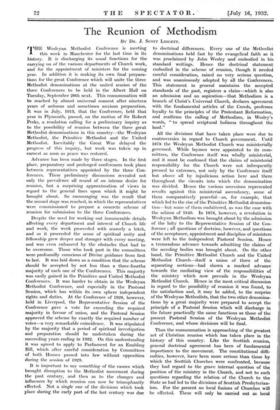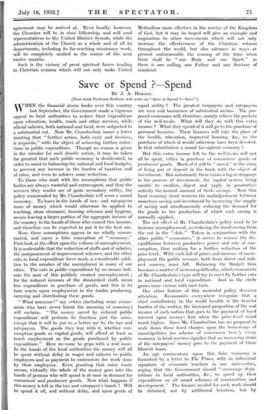The Reunion of Methodism BY DR. J. SCOTT LIDGETT.
THE Wesleyan Methodist Conference is meeting this week in Manchester for the last time in its history. It is discharging its usual functions for the carrying on of the various departments of Church work, and for the appointment of ministers for the coming year. In addition it is making its own final prepara- tions for the great Conference which will unite the three Methodist denominations at the united session of the three Conferences to be held in the Albert Hall on Tuesday, September 20th next. This consummation will be reached by almost universal consent after nineteen years of arduous and sometimes anxious preparation, It was in July, 1913, that the Conference, held that year in Plymouth, passed, on the motion of Sir Robert Perks, a resolution calling for a preliminary inquiry a$ to the possibility of reunion between the three great Methodist denominations in this country—the Wesleyan Methodist, the Primitive Methodist and the United Methodist. Inevitably the Great War delayed the progress of this inquiry, but work was taken up in earnest as soon as peace was restored.
Advance has been made by three stages. In the first place, preparatory and prolonged conferences took place between representatives appointed by the three Con- ferences. These preliminary discussions revealed not only the prevalence all round of an intense desire for reunion, but a surprising approximation of views in regard to the general lines upon which it might be brought about. So encouraging was the result that the second stage was reached, in which the representatives were commissioned to prepare a concrete scheme of reunion for submission to the three Conferences.
Despite the need for working out innumerable details affecting every department and interest of Church life and work, the work proceeded with scarcely a hitch, and as it proceeded the sense of spiritual unity and fellowship grew deeper and stronger with every meeting, and was even enhanced by the obstacles that had to be overcome. Those who took part in the committees were profoundly conscious of Divine guidance from first to last. It was laid down as a condition that the scheme should be accepted by not less than a three-fourths majority of each one of the Conferences. This majority was easily gained in the Primitive and United Methodist Conferences. It was harder to obtain in the Wesleyan Methodist Conference, and especially in the Pastoral Session, which has within its own sphere independent rights and duties. At the Conference of 1928, however, held in Liverpool, the Representative Session of the Conference gave a vote far exceeding the required majority in favour of union, and the Pastoral Session approved the scheme by exactly the required number of votes—a very remarkable coincidence. It was stipulated by the majority that a period of spiritual investigation and preparation should be undertaken during the succeeding years ending in 1982. On this understanding it was agreed to apply to Parliament for an Enabling Bill, which after careful consideration by Committees of both Houses passed into law without opposition during the session of 1929.
It is important to say something of the causes which brought disruption to the Methodist movement during the past century, and then as to the changes and influences by which reunion can now be triumphantly effected. Not a single one of the divisions which took place during the early part of the last century was due to doctrinal differences. Every one of the Methodist denominations held fast by the evangelical faith as it was proclaimed by John Wesley and • embodied in his standard writings. Hence the doctrinal statement embodied in the scheme of reunion, though it needed careful consideration, raised no very serious question, and was unanimously adopted by all the Conferences. This statement in general maintains the accepted standards of the past, registers a claim—which is also an admission and an aspiration—that Methodism is a branch of Christ's Universal Church, declares agreement with the fundamental articles of the Creeds, professes loyalty to the principles of the Protestant Reformation, and reaffirms the calling of Methodism, in Wesley's words, " to spread scriptural holiness throughout the land."
All the divisions that have taken place were due to controversies in regard to Church government. Until 1878 the Wesleyan Methodist Church was ministerially governed. While laymen were appointed to its com- mittees, the Conference itself was wholly ministerial, and it must be confessed that the claims of ministerial responsibility for the Church were not infrequently pressed to extremes, not only by the Conference itself but above all by injudicious action here and there throughout the circuits into which the denomination was divided. Hence the various secessions represented revolts against this ministerial ascendancy, some of them comparatively peaceful—as, for example, that which led to the rise of the Primitive Methodist denomina- tion—but some of them embittered, as was the case with the schism of 1849. In 1878, however, a revolution in Wesleyan Methodism was brought about by the admission of the laity to the Representative Session of the Con- ference ; all questions of doctrine, however, and questions of the acceptance, appointment and discipline of ministers were left to the independent Pastoral Session. Hence a tremendous advance towards admitting the claims of the seceding bodies was brought about. On the other hand, the Primitive Methodist Church and the United Methodist Church—itself a union of three of the separating sections—had shown a marked advance towards the mediating view of the responsibilities of the ministry which now prevails in the Wesleyan Methodist Church. Hence in the most critical discussion in regard to the possibility of reunion it was found, to the satisfaction and, it may be added, to the surprise of the Wesleyan Methodists, that the two other denomina- tions by a great majority were prepared to accept the principle of a Pastoral Session which will discharge in the future practically the same functions as those of the present Pastoral Session of the Wesleyan Methodist Conference, and whose decisions will be final.
Thus the consummation is approaching of the greatest act of Christian reunion which has taken place in the history of this country. Like the Scottish reunion, general doctrinal agreement has been of fundamental importance to the movement. The constitutional diffi- culties, however, have been more serious than those by which the Scottish Churches were confronted, because they had regard to the grave internal question of the position of the ministry in the. Church, and not to such questions regarding the relation of the Church to the State as had led to the divisions of Scottish Presbyterian- ism. For the present no local fusions of Churches will be effected. These will only be carried out as local agreement may be arrived at. Even locally, however, the Churches will be in close fellowship, and will send representatives to the United District Synods, while the administration of the Church as a whole and of all its departments, including its far-reaching missionary work, will be completely unified in the course of the next twelve months.
Such is the victory of great spiritual forces tending to Christian reunion which will not only make United Methodism more effective in the service of the Kingdom of God, but it may be hoped will give an example and inspiration to other movements which will not only increase the effectiveness of the Christian witness throughout the world, but also advance in ways at present unforeseeable the coming of the time when there shall be " one Body and one Spirit," as there is one calling, one Father and one Saviour of mankind.



































 Previous page
Previous page